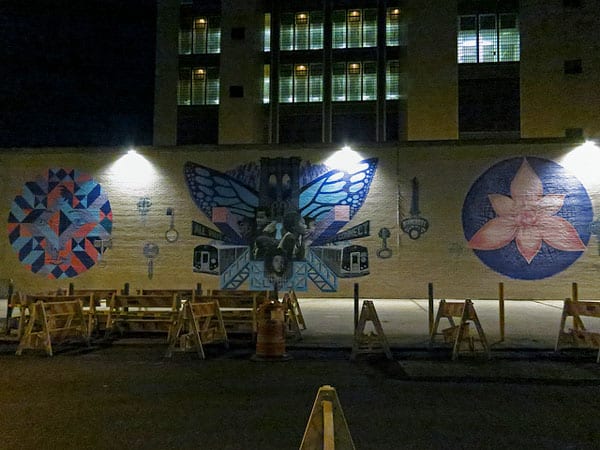
February 3, 2019; New York Times
The wall of the warehouse at 43 29th Street in Brooklyn, New York is covered with handmade signs. They read, “Te Amo, Gordo” and “Happy Father’s Day Chris B.” They are from friends and family of the inmates at Metropolitan Detention Center (MDC) across the street, a jail whose windows look onto the wall of the warehouse. The signs are a way to communicate with loved ones inside, who can signal out their windows with flashlights.
This week, that communication took on a more desperate form. The New York Times’ Annie Correal reported that MDC, which houses more than 1,600 people, had been without electricity and heat for days while temperatures plummeted during a polar freeze. The jail and the Department of Corrections did not notify friends and family about the power failures; instead, they found out through Twitter and news reports.
Union officials told the New York Times that the jail lost power on January 5th. The week of January 27th, the units that draw water to the boilers to create heat froze, so even though the heat was on, the units were disabled. This, then, was not a break or an unforeseen event, but the result of lackluster attention to equipment that was not able to handle extreme temperatures. (Similar issues affected 10,000 residents of New York’s public housing.)
Catana Yehudah, whose brother Jason Smith is inside, was leading protests against the power failure when the banging from inside increased in volume. She commanded the chants to stop for a second and called, “If there is no heat, bang on the windows!” People furiously banged shoes and fists, wordlessly signaling their distress. A statement from the Bureau of Prisons claimed that “inmates have hot water for showers and hot water in the sinks in the cell,” as if that were somehow sufficiently humane.
Ken Sofer, policy and planning officer of the International Rescue Committee (IRC), who was at the protest outside the prison, tweeted,
The most incredible part of the protest was the way organizers have created accountability for the Bureau of Prisons by directly communicating with the people inside. We asked them questions over a loudspeaker and they responded by knocking on their cell windows. #MDCBrooklyn
The situation encapsulated the dehumanizing situation at MDC; as far back as 2016, Magistrate Judge Cheryl Pollak refused to send a defendant there because conditions were “unconscionable.” NPQ has reported on the deplorable conditions at MDC before, when several Muslim people were held there pending immigration hearings.
Nick Pinto of The Intercept reported that critical medical services were not being provided during the outage; people in need of CPAP machines for sleep apnea or medication to control bipolar and other disorders went without. Correal and colleagues at the New York Times reported that it seemed protesting families had been tear gassed when they tried to go past security barriers to see if their loved ones were okay.
Sign up for our free newsletters
Subscribe to NPQ's newsletters to have our top stories delivered directly to your inbox.
By signing up, you agree to our privacy policy and terms of use, and to receive messages from NPQ and our partners.
Rep. Jerrold Nadler (D-NY) said, “There’s a total lack of urgency or concern on the part of the prison administration with respect to getting the heat and the hot water, getting the services we need.”
Adding insult to injury, many major news outlets described the various convictions (or lack thereof) of those inside, as if that should be relevant to provision of humane living conditions.
Lights and heat went back on Sunday, February 3rd, after a week of dark, freezing cells, inadequate medical care, and a moratorium on calls and visits from families, lawyers, and others. Men and women in the prison flashed their lights to signal to the activists outside that they had been successful in pressuring MDC.
Mayor Bill de Blasio tweeted,
A federal official confirmed to me the power is back on at MDC. Make no mistake: this took people power. Thank you to the families, activists and officials who fought for the dignity of people inside. More work ahead—let’s keep at it.
The mayor also sent blankets, hand warmers, and generators against the wishes of jail officials, although several activists noted that he himself was not at the protest.
On Monday afternoon, Judge DeArcy Hall ruled that MDC had to allow legal visitation, and lawyers were allowed in. Judge Hall wrote, “If the conditions of confinement at MDC are as represented in [Federal Defenders of New York, Inc.]’s submissions, there can be little question that such conditions are constitutionally intolerable.”
But by Monday night, reports came that prisoners were being attacked with hoses and tear gas to keep them from banging on the windows. Federal judges are calling hearings this week to examine complaints about the conditions in the jail.—Erin Rubin













